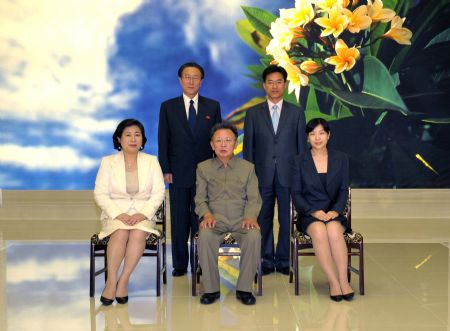Hyun Jung-eun, chairwoman of the South Korean Hyundai Group, visited Pyongyang on Aug. 10-17, a move analysts say may boost inter-Korean ties.
The visit came as tensions over the DPRK and South Korea had increased, in part because of the Democratic People's Republic of Korea (DPRK)'s recent long-range rocket and nuclear tests.
 |
|
Photo released by Democratic People's Republic of Korea (DPRK) central news agency on Aug. 16, 2009 shows Kim Jong Il (C Front), top leader of the DPRK, and Chairwoman of South Korea's Hyundai Group Hyun Jung-eun (L, front) posing for a picture in Pyongyang, capital of DPRK. [Xinhua] |
Hyun's achievements attracted a lot of attention.
She persuaded Pyongyang to free a Hyundai employee in the Kaesong Industrial Park who had been detained for nearly five months for allegedly insulting DPRK leaders. The park, located in the DPRK and just 10 km north of the border with South Korea, was created in 2002.
Hyun was received by DPRK top leader Kim Jong Il, who "complied with all her requests."
Under the agreement, jointly backed by the DPRK's Korea Asia-Pacific Peace Committee and the Hyundai Group, land passage across the heavily armed border, which was closed late last year, will resume. This would allow normal traffic access to Kaesong Industrial Park.
It will also allow tourism to resume at the scenic Mt. Kumgang resort. Tourism had been put on hold a year ago after a DPRK soldier killed a South Korean tourist who had entered a DPRK military zone.
Pyongyang also agreed to let Hyundai launch tours to Mt. Paektuand allow the reunion of families separated by the 1950-53 Korean War to continue in October.
All these issues are closely related to the interests of the Hyundai Group, which runs tourism to the DPRK and operates the Kaesong Industrial Park. These issues are also key to inter-Korean relations, which have been growing increasingly tense after South Korean President Lee Myung-bak took office 18 months ago.
At the end of last year, the DPRK began to restrict traffic over the border, making it more difficult for goods and workers from the South to enter. In May, the DPRK said it was canceling all wage, rent and tax deals in Kaesong and asking for much higher payments.
But the latest agreement signaled Pyongyang was willing to jump-start stalled relations with Seoul by boosting exchanges and cooperation with South Korean enterprises and civilian groups, which in turn might prompt their government to reverse its policies.
Whether Hyun's visit would become a turning point for inter-Korean relations depends on how much the two governments change their current policies, analysts say.
 |
|
South Korea's Hyundai Group chairwoman Hyun Jeong-eun speaks to the media upon her arrival at the CIQ (customs, immigration and quarantine) office, just south of the demilitarized zone separating the two Koreas, in Paju, north of Seoul Aug. 17, 2009, after she crossed the border.[Xinhua] |
In a nationally televised speech marking the 64th anniversary of Korea's liberation from Japanese colonial rule on Saturday, South Korean President Lee said he wanted a "candid dialogue" with the DPRK about dismantling its nuclear programs.
But the DPRK regarded Lee's new approach as a rehash of his previous "non-nuclear, openness, 3,000" plan, which promised that if the DPRK lived up to its promises of nuclear disarmament and openness, Seoul would be prepared to give the DPRK large-scale economic assistance aimed at raising the average per capita income to 3,000 US dollars in the coming ten years.
Monday's official Rodong Sinmun daily derided Lee's speech: "The 'dialogue' and the like touted by them is nothing but a crafty and hypocritical rigmarole intended to evade their responsibility for having torpedoed the inter-Korean dialogue and placate the South Korean public."
As opposed to the openness demonstrated during Hyun's visit, the DPRK showed its persistent tough stand against the United States and South Korea in response to their joint military drill. An order issued by the DPRK supreme command put the whole country on "special alerts", vowing to retaliate the military provocation with nukes.
In sum, Hyun's visit to Pyongyang raised hopes of easing tensions between the DPRK and South Korea, but the input of the two governments is also needed.
(Xinhua News Agency August 18, 2009)